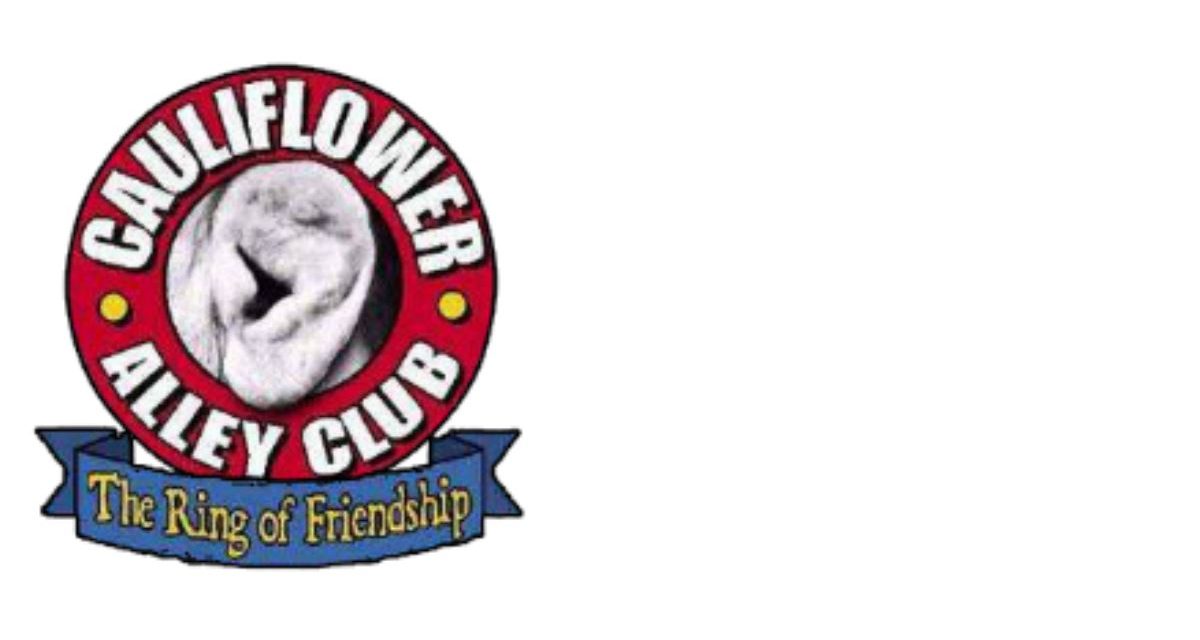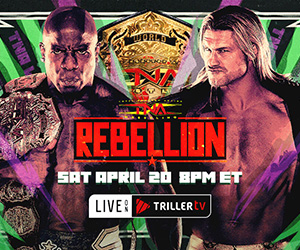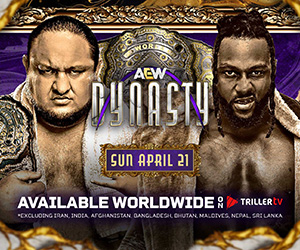LAS VEGAS – Like a stacked show, any number of the honourees at Wednesday’s Cauliflower Alley Club banquet could have been in the main event spot. “Dr. D” David Shults went all free-form, bouncing around with a menacing manic energy, while former NWA World champion Dory Funk Jr. exuded quiet class, and “The World’s Strongest Man” Mark Henry provided laughs, appreciation and a history lesson.
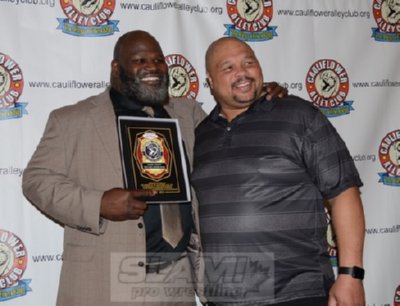
Mark Henry and D’Lo Brown. Photos by Brad McFarlin
And like a stacked show, there were some magic moments, and others where it really seemed to drag.
It all took place at the Gold Coast Hotel & Casino, the CAC’s 54th annual gathering.
The emcee was Jim Ross, missing his glasses so he “couldn’t see a damn thing,” and who demanded, “let’s have some goddamned fun,” right from the start. He also requested that the honourees should “tell your story, do your finish, get the hell out of there.” It didn’t exactly happen like that.
Ross kept things moving, but included personal details on people who were in the room and on the stage. One notable piece of news is that Ross had bought the rights to Jeff Leen’s book, Queen of the Ring, about former women’s wrestling champion Mildred Burke, and he’s had a screenplay writer create Millie about her life. May 1 also marked his 45th anniversary in pro wrestling.
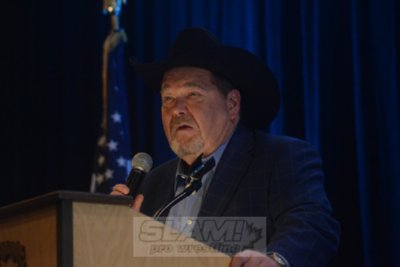
Emcee Jim Ross.
“We are the family of this business,” Ross stressed. “How do we contribute to this organization?” He challenged members to bring new members to the club, and questioned how anyone who draws any sort of a paycheque from pro wrestling could not have a lifetime membership to CAC, only $300 in the United States. (Sign up at caulifloweralleyclub.org.)
The room itself, with almost 600 people, was truly neutral ground in the wrestling wars. Ross, now with AEW and dropping in a couple of plugs for the upcoming debut pay-per-view, sat at the WWE table, which also including Ring of Honor star Kenny King, just across the aisle from the current NWA World champion Nick Aldis, and new Impact Wrestling star Rob Van Dam arriving later in the night.
The CAC’s top award, the Iron Mike Mazurki Award went to recently-retired WWE star and former Olympic weightlifter Mark Henry.
“We backloaded this show, not just in weight and charisma,” said Ross, who teased Mark Henry (as did others) on a couple of occasions earlier in the evening. It was Ross that hired Henry with WWE, having watched him on TV during an NBA All-Star weekend dunk a basketball. “I saw magic in this kid,” he said. “As time went on, and we hired him, I fell in love with him.”
To present Henry with his award, another Ross WWE signee, D’Lo Brown, took the stage. “Mark doesn’t want some script, he wants his friend from 20-plus years to talk about [him],” said Brown, having teased stories he couldn’t tell in public. He considered Henry as the brother he didn’t have. “He taught me how to be a professional, he taught me how to think of things bigger than yourself.”
“Mark’s the kind of guy you hope to be,” he said.
“You almost made me cry,” whispered Henry to Brown when he lumbered up to the podium.
“That’s my job,” said Brown.
“I wasn’t going to start like this, but Sexual Chocolate was not a gimmick,” he laughed after a loud fan made the call out, adding that he’s married with children now. He also noted that his first ever match was against Jerry Lawler, sitting directly to his left, and who is still wrestling.
“I was meant to be a wrestler, from the time my grandmother took me,” he said, pausing — “J.R. said don’t cry. But my emotions make me strong.” He always felt more powerful when he was emotional.
It was not a smooth ride. “Every time I left this business, I came back better,” he explained. At home, he was studying, trying to improve, to figure out a next step. “That thing is history.” He referenced a slave wrestling in the 1800s, Black Sam, that Abraham Lincoln was a wrestler, and into the 1940s, a forgotten trailblazer such as Black Panther Jim Mitchell.
Henry also talked about various people in the room, from studying tapes to being trained in part by Funk Jr. Another trainer was Leo Burke up in Calgary, who taught him how to throw a punch, and to protect your opponent.
“The Cauliflower Alley Club is designed so we all can live forever,” he said, having researched the history of the CAC and its founder, for whom the award he was receiving was named. Henry noted that the CAC needed to get younger, and offered up some suggestions on improving things. Henry also donated $1,000 to the CAC. “We all we got,” he said.
After Ross called Dory Funk Jr., the recipient of the Lou Thesz Lifetime Achievement Award, “the greatest NWA World champion of all time,” he shared a tale of being 22 years old and refereeing a world title bout between Funk Jr. and Harley Race. “If anybody embodies Lou Thesz, it’s gotta be Dory Funk Jr.,” Ross said. “It was about wrestling and physicality and realness.”
Ross praised Aldis for his match last weekend at the NWA’s Crockett Cup against Marty “The Villain” Scurll, and Aldis took to the stage dressed to the nines, with a deep appreciation for the role he finds himself in as a NWA World champion. Aldis recalled his own learning under Funk Jr. during his early Impact Wrestling days, being surprised that Funk not only knew him, but complimented him on blending the American and British styles. Aldis talked about how the idea is to pass on legacies, and that “Dory Funk Jr. has been holding the door open” for years, said Aldis, listing names like the Hardys, Edge, Christian, and Kurt Angle who all learned from Funk Jr.
To begin, Funk Jr. thanked everyone for their appreciation for professional wrestling. He also said that the current NWA hierarchy, under Billy Corgan, were bringing it “back to prominence.”
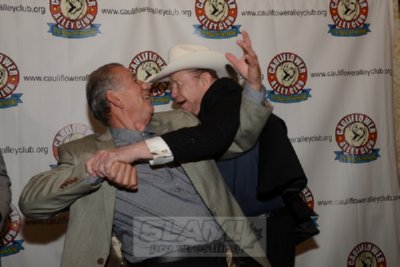
Jerry Brisco and Dory Funk Jr. tie up once again.
“There was nobody like Jack and Jerry Brisco to work with,” Funk Jr. said after jokingly saying that Jerry had just challenged him to a bout at Funk’s school in Ocala, Florida. He praised Jack Brisco even more, and said he deeply missed the former champ.
Pacing himself like he was going during yet another lengthy match, Funk Jr. often paused, the crowd quiet in anticipation as he found his place on his notes, repeating himself on occasion.
“Technically Lou Thesz is one of my trainers. The first thing he showed me was the double wrist-lock, and it was his signature move,” said Funk Jr., recalling the mats his father, wrestler/promoter Dory Funk Sr. would set up in the garage in Amarillo, Texas. He then tried to find a volunteer for a demonstration of how the wrist-lock would become a takeover, to no avail.
Thesz and Funk Jr. worked against each other three times before Funk Jr. was NWA World champion, and three times after.
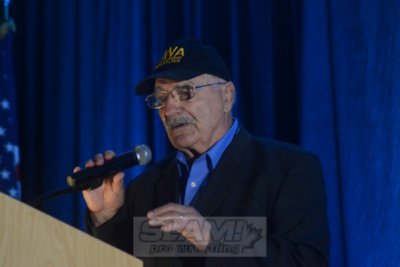
Nick Kozak.
CAC executive vice-president Scott Teal presented the Men’s Wrestling Award to Nick Kozak. Teal mentioned Kozak coming to a wrestling reunion at his home in Tennessee, and, at 80-years-old, immediately getting up to help break down the ring.
Kozak talked about his early days as a champion amateur in British Columbia. “Old school wrestling, that’s the way I was brought up,” he said, talking about travelling, working with the likes of Lou Thesz, Pat O’Connor, Gene Kiniski, and other greats. “In regards to professional wrestling, to me it was number one,” he said, wishing he could go another 35 years.
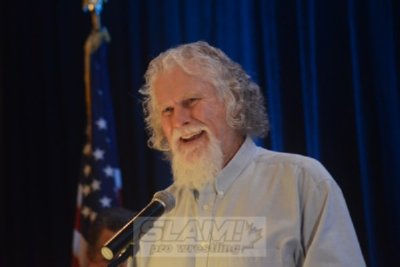
“Dr. D” David Shults.
After Ross called “Dr. D” David Shults one of the most unique performers in wrestling history, John Cosper went to the podium. Cosper worked with Shults on his book, Don’t Call Me Fake. Cosper talked about Shults’ work as a legit bounty hunter and detective, before detailing his rise to wrestling fame and then a sudden end after blasting reporter John Stossel.
Shults warned that it would be a wild ride, and brought an envelope that he said had a statement from Stossel that he was not hit in the ear. He called out Stone Cold Steve Austin for things he said, and claimed he had one good fight left. “I need another award like I need a hole in the head,” said Shults. “I skip around a lot, because I have a lot to talk about.” He talked about a time on the road where Jerry Lawler had a gun to his head and how Shults interceded, before getting serious again.
“I was put out on the street by the WWF,” he said, following the Stossel incident. He noted that not one pro wrestler called to offer him any help, knowing that Vince McMahon had basically told people not to call him. The blackballing resulted in the bounty hunting job. “I was good at what I did,” he said after a long story about picking up a bug-covered woman.
“I survived, I made it,” Shults said, pointing out his wife in the audience, as they approach their 50th wedding anniversary. “I’m still around, I’m not dead, I’m in great shape, I think.”
Twenty minutes in, he started in on Hulk Hogan, and his big head, and how he complained that Shults was stiff in the ring. “You big, damn crybaby,” he said, recalling how Hogan lived in his home for a time. “We was close, very close. Then all of a sudden, we weren’t close no more. … Enough about him, I don’t want to give him no more publicity.”
In short, well, long, Shults promised to come back next year “if you’ll have me back.” Ross praised him, because “he loves being a villain.”
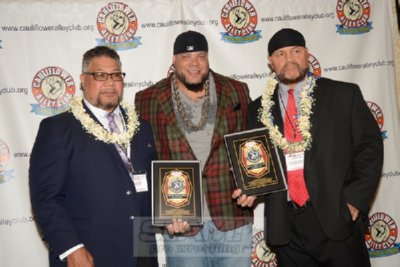
Haku/Meng, Brodus Clay and Barbarian.
The Tag Team Award went to the Faces of Fear Haku and Barbarian, who were introduced by former WWE star Brodus Clay/Tyrus (George Murdoch). He detailed their trip from Tonga to Japan to learn sumo wrestling, before arriving on North American shores. “They captured the American Dream, these two immigrants,” he said, who both went on to normal 9-to-5 jobs post-wrestling career. From his friends, he learned to take care of his family, even if the gimmick — like the Funkasaurus — isn’t what you want.
Sporting matching white and blue leis, Haku and Barbarian didn’t look out of place in their suits, but it was undoubtedly the longest promos of their careers.
Barbarian began, thanking everyone for the honour and God for the blessings. Mentioning his primary pro wrestling trainer Red Bastien, a former CAC president, got a good round of applause. “Back then, it was a little rough. We set the ring up, we wrestled, we broke the ring down,” he recalled, being paid with a Coke and hot dog. “When we had a really good house, he gave us $20 a piece.” Up next, he went to Portland, Oregon, and made $600 a week to his delight. When he was going back to California, he quit, not wanting to go back to earning hot dogs and Cokes. His wife and Bastien got him off later to San Antonio, Texas, and his career took off. He also shared the first time he drew “colour” was in a match with Jerry Lawler, and learned to do it himself instead of having Austin Idol gig him. He closed by thanking those who paved the way, and left the stage for Haku/Meng, who he recalled wanting to wrestle like “but not as bad” after seeing him at Los Angeles’ Olympic Auditorium.
While Barbarian was quiet in tone, following along his notes from the heart, Meng/Haku’s voice carried a lot more, drawing laughs about needing to take a “nervous piss” before matches, and now while waiting to talk. He felt that he “God and Tonga are my inheritance” and that he “put that on my shoulder” and it was a heavy responsibility. He took everyone on a ride through his career, from early days with the Funks, to getting fired by Jerry Brisco in Florida, to nearly getting arrested in Tennessee “for minding my own business in my favourite country bar.” (Shults later noted that he had been there for that moment.)
An unscripted presentation went to James “Kamala” Harris, the Courage Award, which debuted in 2018 for the late Brickhouse Brown. Harris was shown in a video. “This means so much to me. For 30 years, I never received an award like this,” said the Ugandan Giant. “I may have lost my legs, but nothing can keep me down, because people are pulling for me, praying for me, supporting me, in so many wonderful ways, and I thank you, I thank you from the bottom of my heart.” CAC President Brian Blair accepted it on his friend Kamala’s behalf. The CAC has given its financial limit to Kamala already, so a GoFundMe campaign was begun, raising $15,000, so Harris could keep his home.
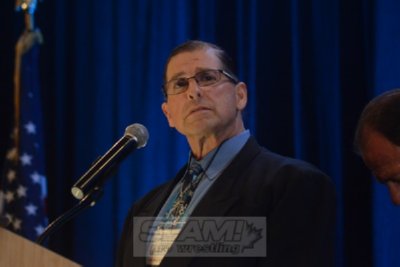
Rico Constantino.
Along the same lines, former WWE star Rico Constantino took the stage to thank the CAC for its financial aid following unexpected health challenges. “They came in my time of need,” he said.
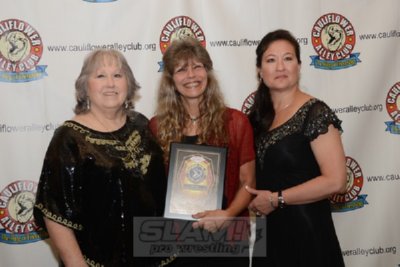
Joyce Grable, Bambi Selina Majors and Malia Hosaka.
Nigel Sherrod presented a Women’s Wrestling Award to “Bambi” Selina Majors, who currently works with WOW, before bringing up Joyce Grable and Malia Hosaka. Grable trained Majors in her backyard in Georgia. “She wasn’t there to meet the guys, she wasn’t there to influence anyone, she wanted to be there to be a woman wrestler,” said Grable. “Her first match, she was great.” Hosaka was a tag team partner of Bambi’s in LPWA. “She had that fire from the time she stepped in the ring,” said Hosaka, calling her the “top babyface of her era.”
Wiping away tears before she took the stage, a beaming but unsure Majors said, “I’m more nervous now than I was in my very first match with Joyce.” She thanked a number of people in the room, from Grable and Hosaka. “As a kid, I never thought I’d make it this far.”
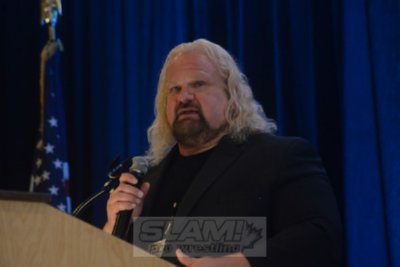
Andrew Anderson.
The first award of the evening was presented by the “Prince of Darkness.” “Andrew Anderson has that heart, has that timing …. the love of the business,” said Kevin Sullivan while introducing one of the Men’s Wrestling Awards.
What followed was both a funny and touching speech from the admittedly nervous Anderson, veering from thanks to his “fathers” in pro wrestling: Superfly Snuka, Greg Valentine and Sullivan, to some crude jokes, including a tale about being in Africa with dysentery along with Sullivan. “We’d have duelling banjos inside of the bathroom,” he revealed, claiming his “socks are still dirty from that.”
“I’ve never been an indy darling … I’ve always been me,” said Anderson, who has also done many movie roles.
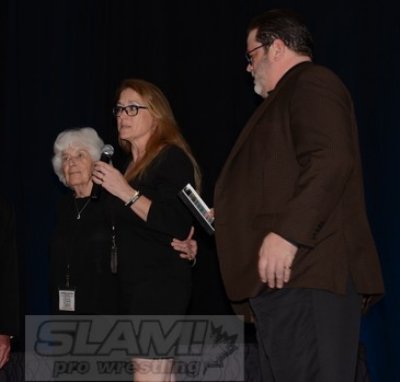
Dick Beyer’s widow, Wilma, daughter, Kris, and son, Kurt.
The announcement of the bowling tournament winner, Michael Dakota, and the cribbage tournament winner, Kurt Beyer, led to a tribute to “The Destroyer” Dick Beyer, which nicely tied up the entire few days of the reunion in Las Vegas. When Dick Beyer died, fans reached out, helping balance the pain of loss. “We felt everyone’s pain too,” said Kris Beyer, Dick’s daughter. “This is the best business to grow up in, and this is my family.”
The long evening, running more than three and half hours of presentations alone, closed out with a re-written version of “My Way” performed by Pepper Martin.
RELATED LINKS
